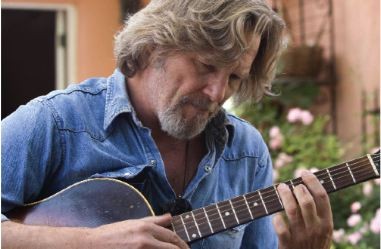Crazy Heart

The title of Scott Cooper’s debut film, Crazy Heart, comes from a song by the movie’s protagonist, a country singer named Bad Blake (Jeff Bridges). At 57, Bad is an alcoholic and is shut down artistically, but he’s still working the road and hanging on. The song alludes to picking up his crazy heart and giving it one more try. That’s the theme of this poignant movie, whose intimate style evokes the films of the 1970s.
Bad has long hair and wears a beard, shades and a ten-gallon hat—the last of which he plops on his microphone when, loaded in the middle of a gig, he has to run to the men’s room to throw up. But Crazy Heart isn’t about an apathetic has-been or a spoiled, selfish drunk; it’s the flip side of Payday, the 1973 minor classic in which Rip Torn played a third-tier country star whose only loyalty was to his own physical pleasures. Bad is exhausted from the road and dispirited by the wan, cut-rate venues his manager sends him out to. He hasn’t written a new tune in years. But he doesn’t begrudge his audiences the pleasure they’ve come for: he accedes to their requests with an indulgent, sexy grin and even gets one of his middle-aged fans up to dance.
Without a doubt Bad is a deeply flawed man; he has four ex-wives and a son he hasn’t laid eyes on in decades. But he isn’t self-deluding about the mess he’s made of his personal life, and he isn’t uncaring. When he gets involved with a much younger music writer (Maggie Gyllenhaal), a divorcée with a little boy, his kindness and generosity come to the fore, and he makes a romantic leap of faith like the man in his song. You know he’s going to mess it up—he hasn’t come to terms with his alcoholism—but Cooper (who also wrote the script, based on Thomas Cobb’s novel) and Bridges have us rooting for him.
Jeff Bridges has been making movies for about as long as Bad has been touring; the first pictures he made a splash in—The Last Picture Show, Fat City—are nearly 40 years old. But he’s never closed down his own creative impulses by repeating himself or settling for easy choices, and he’s never been better than he is here. Bridges hasn’t played a singer before, but his worn, occasionally meandering voice sounds authentic, and the songs inhabit him—he doesn’t perform them so much as let them fall out. His exchanges with Robert Duvall (as a Houston club owner and an old fishing buddy) and with Colin Farrell (playing the one-time bandmate who’s become a big star) are effortless slices of naturalism.
Bridges’s rapport with Gyllenhaal—giving yet another of her superbly judged character performances—is even lovelier. Gyllenhaal’s Jean is hard-bitten, a survivor of a series of failed relationships, but she’s soft and pliant underneath her wariness, and she falls for Bad’s warmth and good intentions even though she knows the danger of falling in love with a man who can’t lay off the bottle. The first interview he gives her (as a favor to her uncle, who runs a club Bad plays) is an extended not-quite flirtation; when she returns for a second one after one of his gigs, he makes the flirting overt and she blushes, which knocks him out. They wind up in bed, and before she can take a wide-eyed look at what’s transpiring he’s begun to court her in earnest, cooking up breakfast for her and charming her son. They both gamble their hearts against their experience, but the tables are rigged.
The film has no special visual distinction, but it’s genuine to the core. That songwriter and producer T Bone Burnett was involved with the project—he co-wrote “The Weary Kind,” the movie’s theme song—is one more sign that Cooper knows exactly what he is doing.





